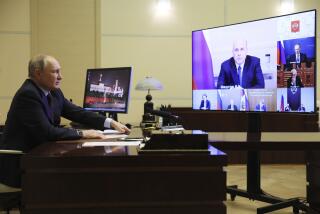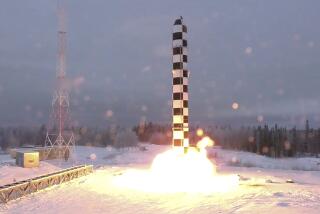New Report Focuses on Reviving Test Ban Treaty
- Share via
WASHINGTON — In a bid to resuscitate the Comprehensive Test Ban Treaty, which the Senate resoundingly rejected in October 1999, retired Gen. John M. Shalikashvili is to present a report to President Clinton today recommending steps to build bipartisan support for the pact.
Shalikashvili, former chairman of the Joint Chiefs of Staff, said the treaty should be subject to joint review by the Senate and administration every 10 years. If “grave doubts” remained about the treaty’s value, he said, the president could withdraw from it by citing the “supreme national interests” clause of the accord.
Shalikashvili also proposed specific measures to improve the monitoring of other countries’ nuclear programs, to detect nuclear tests and to maintain the safety and reliability of the U.S. nuclear stockpile.
Ten months ago, Clinton appointed Shalikashvili, a supporter of the treaty, to consult with Democratic and Republican lawmakers in the wake of the 51-48 Senate vote for the pact, which fell well short of the two-thirds majority needed for ratification. Many viewed it as the most significant treaty defeat since the League of Nations was rejected after World War I.
President-elect George W. Bush has said he opposes the treaty. But Shalikashvili asserted in an interview Thursday that the “Bush administration should take a second look at this treaty as part of their overall strategy.” Despite some risks, he said, “we are better off with this treaty than without.”
One possible ally for Shalikashvili is Bush’s nominee for secretary of State, retired Gen. Colin L. Powell, who in the past joined other chairmen of the Joint Chiefs in supporting the treaty. Powell has not commented recently.
More to Read
Get the L.A. Times Politics newsletter
Deeply reported insights into legislation, politics and policy from Sacramento, Washington and beyond. In your inbox twice per week.
You may occasionally receive promotional content from the Los Angeles Times.










